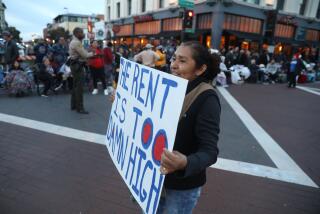Book review: ‘Fubarnomics’ by Robert E. Wright
- Share via
We live in an era of economic anxiety. There have been other such eras, but this one seems particularly acute. Though the actual fortunes of Americans differ widely, there is a shared sense of something not right. That sentiment acts as a negative glue, binding Americans in a collective malaise.
In the words of economist and professor Robert E. Wright, America today is a FUBAR economy, a system that is “fouled up beyond all recognition.” In a series of essays that constitute his uneven yet entertaining book, Wright explores key examples of the “Fubarnomics” that characterize the United States today. These range from the very big (healthcare and Social Security) to the historical (slavery in the Southern states before the Civil War) to the particular (tenure and higher education, construction costs). And Wright is not content simply to diagnose: He attempts to craft answers, none of which is overly practical or in danger of being enacted (which he admits) but which at least represent an implicit acknowledgement that casting stones is easy and societal reform is hard, hard, hard.
In identifying a culprit for the present state of affairs, Wright is ecumenical: He blames government and the market, individuals and groups. No one is spared. Historical and foreign precedents are also used to good effect. Few readers will be familiar with the housing and mortgage policies of pre-Revolutionary America, yet Wright shows how a “hybrid” system that was neither fully private nor public contributed mightily to economic dislocations that fueled the Revolution. That parallels the public-private home ownership system of today — in which the government through Fannie Mae and Freddie Mac as well as the mortgage tax deduction subsidizes home ownership. Although the meltdown of that system has yet to cause a revolution, it has undoubtedly strained the social fabric.
Though he frequently reiterates that “we need both governments and markets,” government comes in for the lion’s share of abuse. The New Deal is excoriated for violating what Wright believes should be a societal “Hippocratic oath” to do no harm. The meddling in the economy under Hoover and during the first term of the Roosevelt administration produced uneven results that led to the second recession of 1937, which improved only because the government did “the one thing that was sure to help: nothing at all.” Though this interpretation of the New Deal has gained traction in conservative circles, it is far from settled, not something you would glean from Wright’s tone.
He is similarly prone to overgeneralizations in describing higher education. Anyone who has tilled the groves of academe knows that pettiness and problems abound, but is it really the case that “many, if not most, college students these days think nothing of lying, cheating, or stealing their way through college”? A similar reductiveness bedevils the chapter on slavery. Yes, the system can be shown not to have made economic sense in the South, especially when compared to the economic vitality of the North, but that only highlights that people do not frame society on the basis of economic theory. That doesn’t make the resulting systems foolish, but it does make them more complicated and less amenable to simple solutions than economists would like to believe.
As for solutions, Wright suggests combining life insurance and health insurance as one way to realign incentives of insurers and alter the behavior of consumers; ending the pernicious practice of contractors bidding low and adding costs by implementing “cost planning”; and preventing the “too big to fail” problems in financial institutions through punitive taxes on size. Unlike many polemicists, Wright has the courage to offer solutions, and while few of the suggestions have any resonance in today’s political climate, they are novel answers to familiar problems.
It’s difficult to read books decrying the current state of the U.S. economy without succumbing to the sense that things are so “fubar” that all is lost. The American system is so convoluted and twisted that only a sea change in attitudes is likely to trigger needed reforms. Simultaneously prosperous and stuck, the United States is expending immense energy staying in place, and jeremiads proliferate. Wright is often insightful, but his work stands as a further reminder of problems more than a beacon of potential.
Karabell is the author of several books, including the forthcoming (with Aron Cramer) “Sustainable Excellence: The Future of Business in a Fast-Changing World.”
More to Read
The biggest entertainment stories
Get our big stories about Hollywood, film, television, music, arts, culture and more right in your inbox as soon as they publish.
You may occasionally receive promotional content from the Los Angeles Times.










